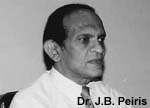 |
 1st March 1998 |
Front Page| |
Dr. J. B. Peiris: his crusadeDr. J. B. Peiris until recently was the Chairman of the Sri Jayewardenapura Hospital given to Sri Lanka at the cost of 860 million rupees by the Government of Japan in 1984. From 1994, for three and a half years he headed this institution considered one of the best in South Asia.
"I wanted to prevent people seeking treatment overseas so I set about first to provide a sterile atmosphere and got equipment for advanced surgery be it cardiac or otherwise." "When I took over some wards were not occupied. I started the Orthopaedic clinic, ENT wards and the Cardiology unit. "Also I started the Paediatrics and also Nephrology unit not found elsewhere in hospitals in the country and soon kidney transplants will be started. "I also began the Neo-natology unit that is saving the lives of new born babies. The Jayewardenepura hospital was also made a tertiary referral hospital where patients who could not get cures in rural and provincial hospital could find cures in this hospital. "When I took over in 1994 only 50 percent of the hospital was occupied, now it is 70 percent for the year, and the patient turnover has increased from one lakh fifty to two and a half lakhs per year. I had no Trade Union problems which plagued the hospital on and off since the hospital began in 1984. Every month I met consultants, medical officers and Trade Union leaders to smoothen out any irritating problems. Revenue during Dr. Peiris' time increased from 50 million rupees a year to 120 million rupees and the hospital which is subsidised was able to generate one third of its own funds after he took over. Many from abroad come to the hospital in search of medical training. Dr. Peiris says he could not have achieved so much but for the magnificent co-operation of doctors and staff and the Director of the hospital Lakshman de Lanerolle. He is now the Chairman of the Postgraduate Institute of medicine. We concentrate on training our doctors to get their postgraduate qualifications over here". He still visits the Neurological unit of the National hospital which was very much his brain-child.
Replacing your hormonesYour Health - By Dr. Sanjiva Wijesinha Until the 20th century, women rarely lived for many years after their menopause. These days, however, most women are likely to live one third of their allotted life-span after experiencing the so-called "change of life''. The average age of menopause is about fifty-when the ovaries no longer manufacture the female hormones oestrogen and progesterone, monthly ovulation no longer takes place and the periods cease. In many ways, this can be the prime of a woman's life, since one no longer needs to worry about getting pregnant or menstruation. For a few years after the periods cease, the ovaries still continue to produce small quantities of hormones called androgens - and these maintain the sex drive. Because oestrogen levels are now at rock bottom, sexual intercourse may become painful. Supplements of oestrogens (available as tablets, skin patches or creams) may be needed - but since this is not a subject that most doctors will start discussing with you, it is up to you to broach the topic yourself. It is quite a common problem, and one that can be easily remedied - as long as you ask your doctor about it! Nature, for whatever reason, has made women less vulnerable to heart disease when compared to men - if you compare the incidence of heart attacks, women as a group suffer less heart attacks than men of the same age. This unfair advantage of the fair sex lasts until the fifties, and seems to be due to the protective effect of the female hormone oestrogen. Once menopause occurs and oestrogen levels fall, the incidence of heart attacks in women and men tend to become similar. Artificially replacing a woman's oestrogen levels after menopause - known as Hormone Replacement Therapy or HRT - is recommended more commonly these days. It is now often prescribed for its heart-protecting effects as a lifelong therapy to women who have a strong family history of coronary disease . From what we know about HRT using oestrogen and progesterone at the present time, it has the following beneficial effects: o protection against heart disease and strokes o protection against osteoporosis (weakening of the bones) o protection against endometrial cancer (a type of womb cancer) Current knowledge about the possible side effects of HRT indicates that it does NOT increase the possibility of breast cancer - although data does not yet exist for women taking HRT for periods longer than ten years. If you feel that you need it, don't hesitate to discuss it with your doctor - because the improvement it confers will not be confined to just your sex life. |
||
|
More Plus * On that faraway February day ...
Front Page| News/Comment| Editorial/Opinion| Business| Sports | Mirror Magazine |
||
|
Please send your comments and suggestions on this web site to The Sunday Times or to Information Laboratories (Pvt.) Ltd. |
||
 Dr.
Peiris assumed his duties with a clear vision that he wanted the hospital
to be well equipped and highly specialised so that people need not go abroad
and spend money for treatment.
Dr.
Peiris assumed his duties with a clear vision that he wanted the hospital
to be well equipped and highly specialised so that people need not go abroad
and spend money for treatment.
